The best teacher is your last mistake…
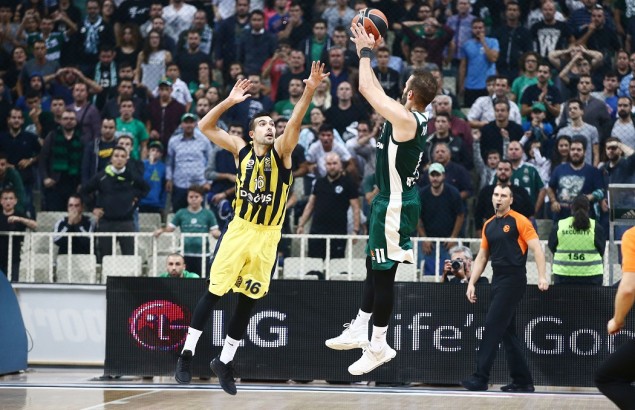
By Jim Katsionis on 30 October 2017

Olympiacos played quite well for several minutes and remained undefeated, surviving the first crash test in the double-game week. The great protagonist, Nikos Pappas, and the great defensive effort of the second half gave Panathinaikos the win against Fener, and matched their poor performance in Moscow, in a game that was decided in its dying seconds, and clearly showed the Greens the direction they should follow from now on. Hoopfellas analyses..
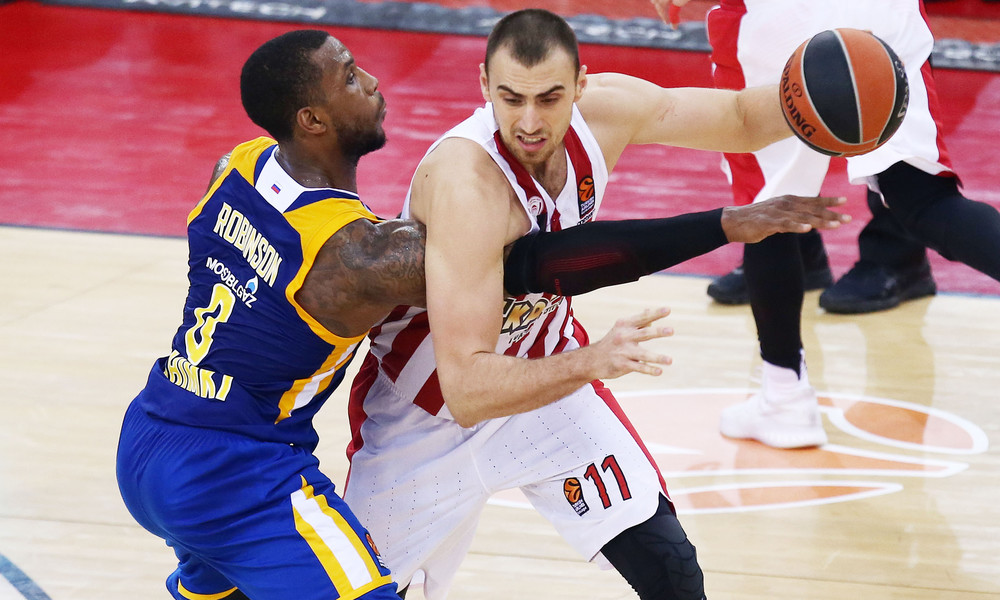
Hello… The first week of “double” games in the Euroleague was full. Nikos Pappas’ heroics set the OAKA fans on fire, and Olympiacos’ sturdy defense that works as a breakwater in the beginning of the season made the difference. Doncic was incredible once again, Brose was improved, and Barcelona are finding it very difficult to decode the new style Sito Alonso wants to play, and are very far from what we call “balance”. We are at a point where the teams that win and lose each night will make several mistakes. Who will use these mistakes to learn and improve their team in the near future?
Let’s shed some light to the teams that gave us enough feedback this week and start with this very interesting table (from @Cappe90)…
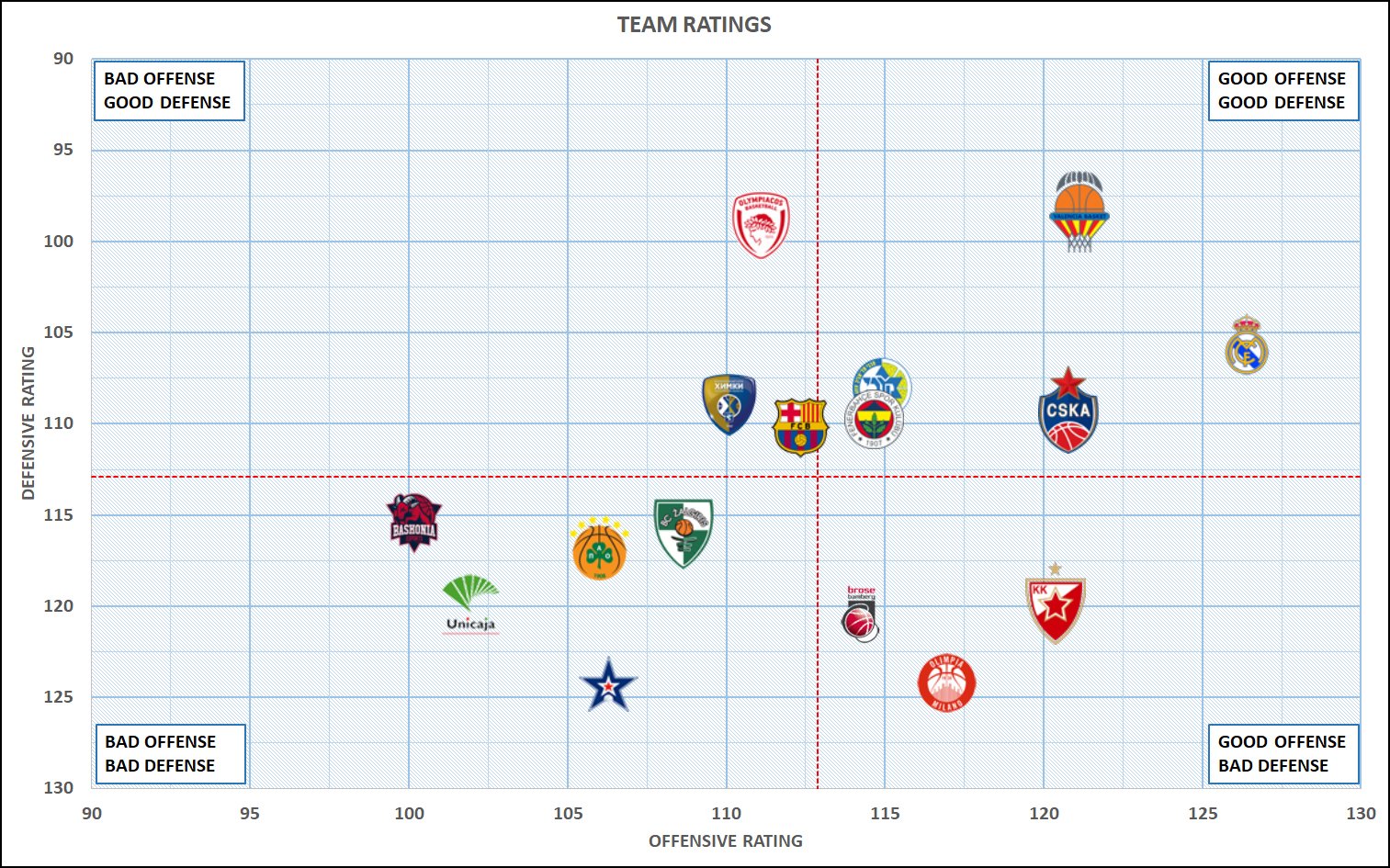
Olympiacos…

I liked Olympiacos in several minutes of their two games. At the moment they have a winning culture that you can only find in CSKA and maybe Madrid.
It’s obvious that the Reds are trying to up the tempo and the number of possessions in their home games, reminding us of their effort two years ago, when in the beginning of the season (with Spanoulis being excellent in getting the team in the second half of the court in transition conditions) they were impressive. Olympiacos is showing a tendency to change their timing in execution with coach Sfairopoulos giving the green light to his players to look at the basket faster, aiming at giving their offense a more aggressive character that will put the pressure on defense (the elevator screen set they used in Israel for Roberts is within that context). Maybe this is his answer to the great playmaking his team lacks in set situations. After all, his guards are operating more like ball movers and snipers, not like playmakers, which is a role played the forwards, as well as Milutinov.

Note: In the Khimki match, the two Reds PGs, Roberts and Strelnieks, had only 2/4 in AST/TO ratio, and at the same time the trio of Strelnieks-Thompson-Papanikolaou has the impressive 9/0…
Regarding the half court, it’s important to examine the importance of Olympiacos’ coherence as a team that helps them in terms of timing and spacing. I am of course, referring to details that become obvious in how the team works off the ball, especially when the ball is in the low post. Good flare screens, proper timing of the upper weak side cut with the baseline screener on the weak side for a short-3. Playing Big has also given them a significant advantage in defensive boards (the pillar of what the Reds are playing), which makes their opponents turn the ball over.
What we predict (based on their history) is that after Spanoulis is back, and the deeper we get in the season, the Reds will again turn to the safety of half court, where their execution is more trustworthy. At the moment, the juncture has them deciding on relying for most of their possession on the Big lineups with the three forwards and a Center, and the character of their defense lead to this direction. This Big lineup allows for switch defense (controlled, not total switching due to Roberts) and gives the team another shell. A more “robotic” touch, better physical/athletic result, but a lower degree of perception and insight.
Defense: The Name Of The Game

This is the strong point of coach Sfairopoulos, but that doesn’t mean that a high performance level each season (as well as in every time period of the season) should be taken for granted. There are lots of examples. So, it’s important to give credit to the Reds for their defensive performance so far. Olympiacos’ off the ball defense, especially within the space of a pass is simply exquisite. This is very important, as it makes their opponents’ offense doubt itself and change their communication timing, essentially leading it to go to consecutive Plan Bs, which in the long run lead to 1 on 1. The Reds allow only 45.2% of their opponents’ scoring to come through cooperation (No2 after Real Madrid), and with their off the ball defensive behaviour, make it very difficult for the offense to deploy and cooperate according to their plan and find its flow.
Olympiacos pressure very well in the deployment of their opponents’ offense, they have the appropriate perception to “lead” the ball where they want on defense, and they are able to start their offense from there. In the Khimki game, the Russian team looked mentally lost, which shows the distance they have to cover in terms of character, if they want to see themselves among the European elite. When things started going downhill for the Russian team, they didn’t have the discipline in very short periods of one defensive/one offensive possession and lost their mind (we saw unnecessary helps in their defense, certainly outside their coach’s plan, bad defensive positioning, and giving up in their body language). A few days ago, at Tel Aviv, the Reds played very good defense against DeShaun Thomas (they had the players to do so, as we said in the Stoiximan preview), “removing” the Stretch-4 abilities he brings to the Maccabi offense from the “4” position. Without pure playmaking from the point guard position, the Israeli team were unable to take advantage of Tuys in PnR, who could have really created a problem to the Greek team, as he runs the middle lane like a triple-jumper. Jackson has improved on this, but it is his nature to first look at the basket (of course sometimes he gives as plays like this)…
Maccabi (yes, the same Maccabi that lost the game in Belgrade) are built on proper foundations this year and they need to build their character (of course, I am not referring to the organisation, but to this year’s team) in order to be able to handle marginal situations.
Low numbers in outside shooting are no surprise…

Olympiacos, the team that added Strelnieks-Roberts-Thompson to their roster, aiming at upgrading their backcourt firepower, which was their weak point last year, are shooting with very low numbers from the three point line. They only shoot 28.6%. Let’s go back to what Hoopfellas was saying this offseason, a few months back…
Risking in what we say being a cliché, we had repeatedly pointed out the need for slashing and playmaking so these “weapons” can function well. The main problem for coach Sfairopoulos’ team for their low numbers behind the arc is the process that precedes the shots. Today’s offense is played on close outs. Several active coaches share this opinion… The Reds problem is that they don’t make defenses “gather” closer to the paint, when Spanoulis is off the court. It says a lot that the Greek team shows a tendency to “break free” (responding to their captain’s absence) of their usual middle PnR actions and utilise more side PnR, relying on the ability of their main screeners (and finishers in the paint), Printezis and Milutinov to dribble their way to the paint while keeping their defender on their back, as they are two big men that can lift their head up and see the weak side.
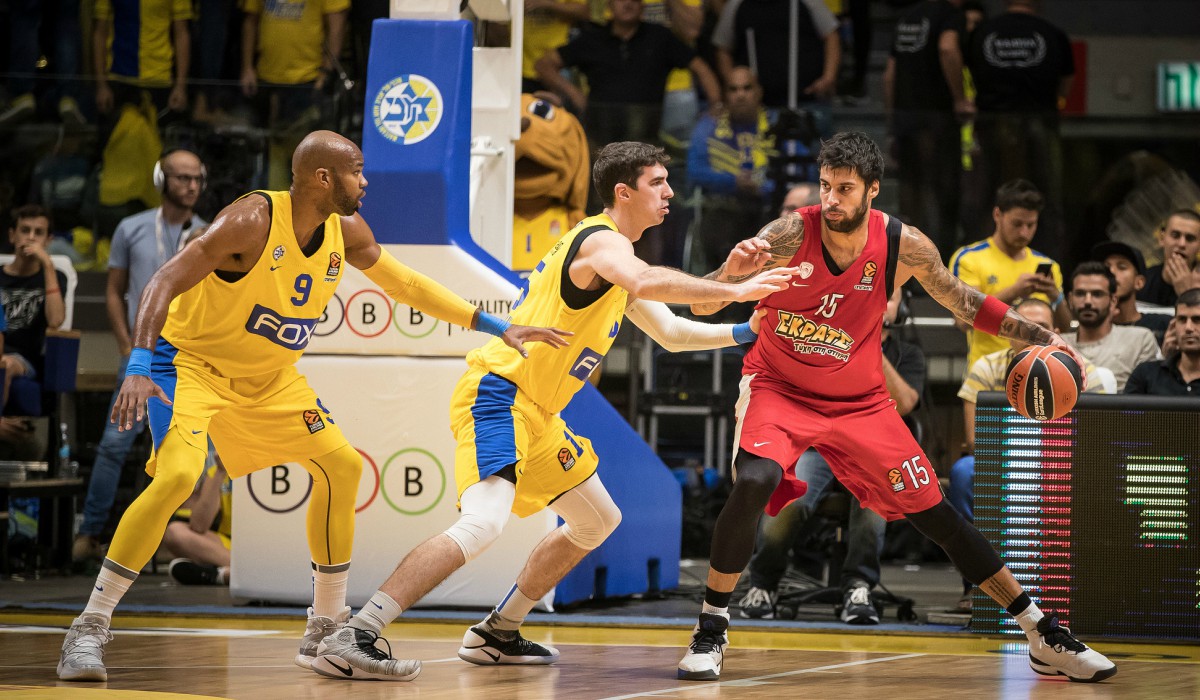
Olympiacos have one of the best Post Up Duos in Europe at the moment in Printezis and Milutinov. They have invested on them both for executing and creating, at least until Spanoulis is back. The Reds used many fakes, i.e. actions that work as “bait”, aiming at leading their opponents’ defense at making mistakes, by showing a supposed intention.
The team that will deny those two players an easy entry pass, by working very much on defense (at the same time trusting their footwork and their behaviour on defensive rotations) may pose problems for them. No team has done that to a great degree.

Also, Maccabi and Khimki did not test the Reds’ PnR defense to their limit. Most guards that run these actions did not have the proper approach, and their coaches are at fault here. After the pick, Markovic was very passive, Shved executed behind the arc almost exclusively, as did Pierre Jackson. Only Cole went deep in the paint with the ball (McLean is not the same player as Birch in terms of peripheral and 1 on 1 defense in the middle lane…) and we all saw the problems he caused…
Olympiacos is doing well in the beginning of the Euroleague with two home games, and they played well in week 3. The Reds played well in long stints of these 80 minutes, building on the “constant” of their defense, which is very good for this time of the year. Everyone at Piraeus knows the weak points of this team very well, and eagerly expect Vassilis Spanoulis’ return. However, the ability of this team to have inexperienced player successfully play major roles within this specific context (defense, team spirit) is the answer to the cynicism of the captain’s inevitable retirement…
There is a problem. As well as time…

After 4 games, Panathinaikos is at 2-2. They haven’t lost any ground in the standings, which is no small matter, especially if we take into account the way they play on defense. At the moment, it looks like Panathinaikos had a new coach arrive only a few weeks ago, especially on the defensive end. This is how bad things are.
The Greens, one of the most low-mistake teams last year (and the best low-mistake coach –in terms of team performance- in the EL in the past few years on their bench), found it difficult to move the ball and to even enter it in the court in Moscow. This occurred against a team for which, in my opinion, each turnover in the perimeter should lead to the game being stopped and automatically giving 2 points on the scoreboard… This says a lot about the concentration level of the team at the moment.

Panathinaikos, a TOP-5 defensive team last year, and a team that kept the main core of its good defensive players, allows their opponents the extraordinary 45.1% from the arc (the highest in the league), a result of poor defensive rotations and lack of cooperation on defense, as coach Pascual is trying to find the “golden ratio” that leads to balanced basketball between the two ends of the court.

It’s obvious that the above average result is a bit surprising (in conjunction with the time period) for a team that didn’t start from scratch and hoped that its performance on defense would give them the required time to build the anticipated new offensive profile. The good thing is that coach Pascual has proved that he can quickly improve a team on this part, when he clarifies the “who, where and when” regarding the handling of a more full roster this year.
So, I think that the second half of the match against Fener may become the starting point for Panathinaikos to show a completely different face in the near future…
A defensive miracle
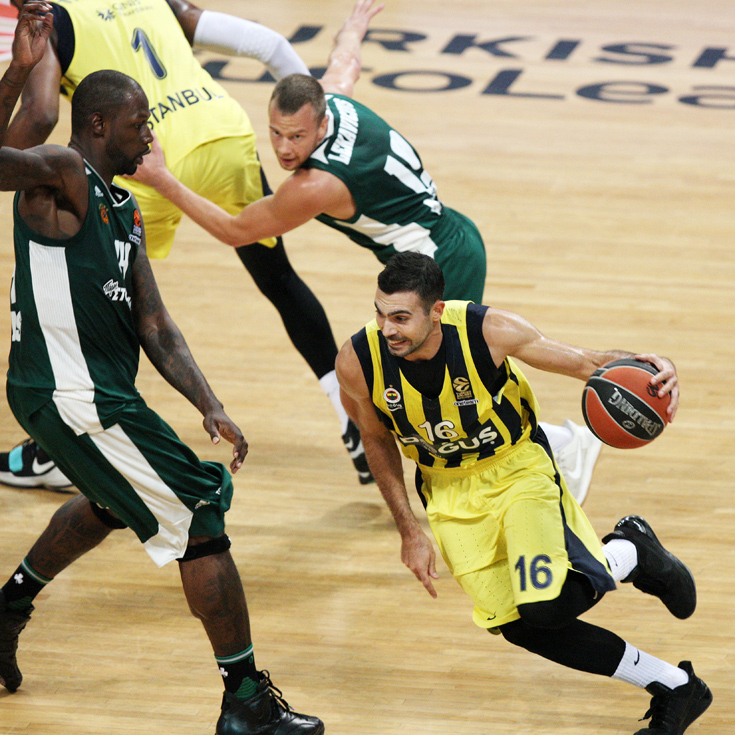
This is the only way to describe the defensive performance of Panathinaikos in the second half of the game against Fener, based on what we had seen from the team in the first 20 minutes, and in the beginning of the season in general. I don’t know if the “OAKA atmosphere that’s full of human souls of the past” (the story of legends of the club’s modern history and their opponents that have bent the knee, as a friend told me…) in conjunction with the power of the feeling of despair (when you know that you want to, but you just can’t do it, a feeling that is very strange for the Greens at home) pushed the home team to their limits and managed to lower Fener to 24 points in total in the second half, but it was clear that the way their opponent attacked, essentially made the coach choose lineups without any weak defenders (no slow feet on the floor). The Panathinaikos team of the second half “pushed” their opponents’ offense away from the basket, and set a different context for them, constantly breaking screens and interfering in the deployment times of the Turkish team, and, mainly, did a great job on the back line, removing from Fener’s vocabulary the term “miss match”. Believe me, this isn’t easy… It’s quite clear that Calathes is on another level compared to any other guard when defending there, and the defense (3/4 or 4/4) of Singleton-Rivers and Thanasis Antetokounmpo’s footwork where the pillars of this defensive outcome.
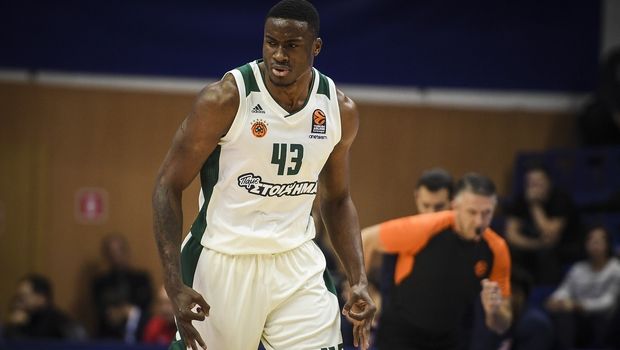
The Greens don’t have deeply developed automated movement, and the required level of defensive coherence to keep their strength at the moment. This is a luxury you can activate when you have automated rotations, the mind doesn’t have to think, driven by the power of repetition and your feet move to the appropriate spot on their own. The Greens are not there at the moment, and this is why they must make their best effort. Obradovic’s Fenerbahce is a team that reads defenses in half court better than anyone in the Euroleague. They smell the blood that leads them, together with the fear of the “weakest link”. They have been doing it religiously in the past 2.5 years. In the first half they took advantage of the middle lane with PnR action on Auguste-Vougioukas, and in each of the 16 minutes Lojeski was on the court, their offensive plan was based on the Belgian wing’ position on the floor. The way they take advantage (“bait” Post Up on the strong side, flare/back screen if needed and a skip pass to the weak side player covered by Lojeski) the Belgian’s Close out (getting the ball on the spot where he will be made to move towards the paint) made lots of noise…
The big (fortunately not decisive) mistake of coach Pascual is that in the fourth quarter, at a time when Panathinaikos had made it almost impossible for Fener to score, he brought Lojeski on the floor, and showed them the way to the basket (Datome immediately scored on him)…
Not: The coach loves Lojeski (as he is still an elite shooter with lots of “miles” at this level), but a deeper look at this match was maybe the beginning for him to reconsider not his appreciation in what he can do, but how to play him, so the player becomes more useful for the team.

The Turkish team has very good potential to be very efficient on offense, given Meli’s ability as a playmaker from various spots on the court (especially in 1-3-1 with the way he can get the ball to the low post from the perimeter, Kalinic as a baseline player will benefit immediately when he returns) may gradually give another dimension to their game.
Le’ts go again. Nowadays offense is played in Close outs…
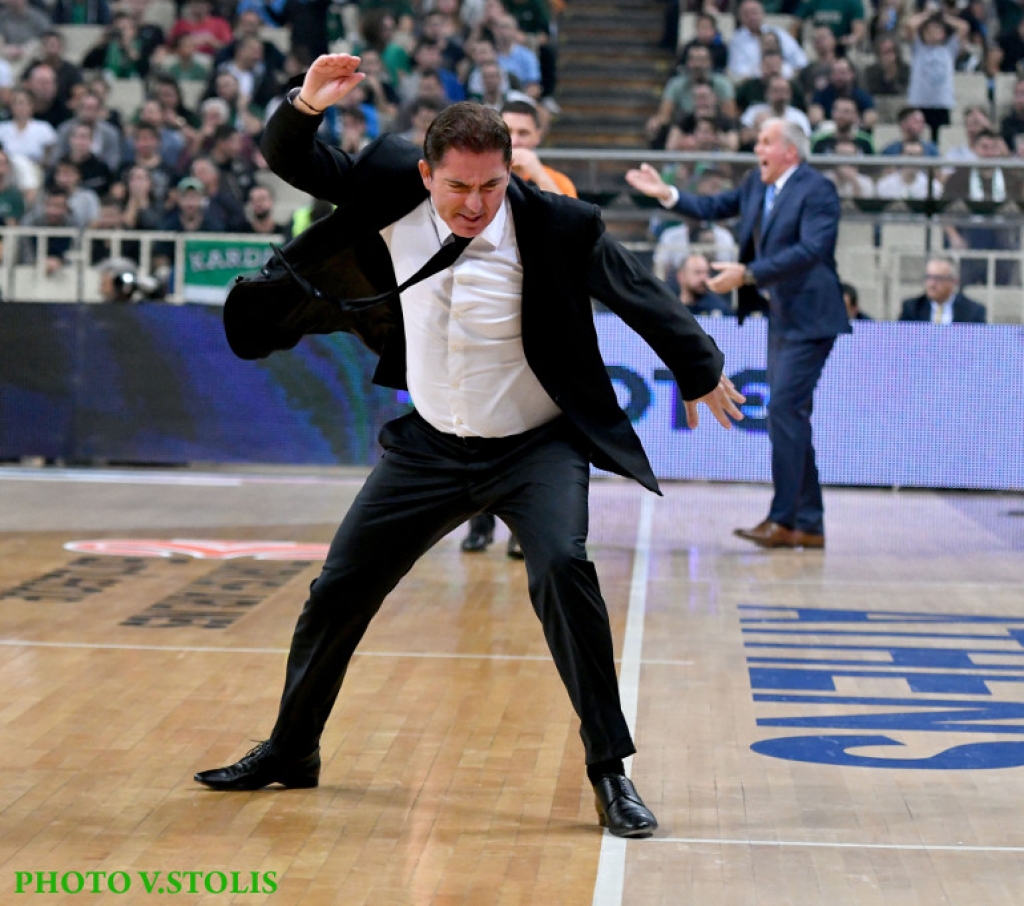
The expected upgrade of the Greens on defense may buy some time for the team to work with less pressure on the offensive end, with an eye on the offense we described in the Offseason. It’s not a matter of choice. Building such an offense is a one-way street. This is why we are so persistent… After all, this was Xavi Pascual’s vision when recruiting this Off Season. Remember what we wrote then…
“If Panathinaikos is unable to have a different kind of offense, based on cooperation, motion principles that will lead to a synchronised action in both the strong and the weak side, ball movement and fundamentals (proper screens, exploiting every inch on the court, spacing), we may be looking for 2-3 player in November…”

Now you have an idea of what we were talking about. Certain players (Lojeski, Denmon for example) are finding it difficult to function, as what Panathinaikos is playing up to now on offense is far from this context, within which they can be very efficient. Both in Moscow and against Fener, coach Pascual showed the tendency to play 2-2 or 3-3, isolating specific players in specific parts of the court. So, what worked to a satisfactory degree last year, due to Singleton’s ability to boost the entire outcome with his ability to fully respond to different roles (as a screener, post player or shooter in the triangles that were set in the middle lane for example) this year produces lack of movement and overdribbling in the Greens offense. It’s obvious that the “Clover” has to work more off the ball, along the (half) court. Ok, I understand that this roster doesn’t have great playmaking abilities, but some of the previous rosters the coach had in Barcelona (with Tomic and G/F such as Ingles or Eidson, this is why we talked about a Shilb-type player, who is getting several playing minutes at Sevilla, and it is rumoured that he is approaching Cverna Cvedza) was built to play in a similar way to what coach Pascual in the past, not last season. What we saw on Friday at OAKA was a copy of what we saw last year. .. Fener stopped Rivers’ Floppy action with a very good Vessely (controlled switch that, depending on KC’s movement when he got the ball, would “lock” as a switch or turned into Show & Recover), trapping and sending the ballhandler to the corner on PnR with Auguste-Vougioukas, Panathinaikos (47.6 AST% this year), next to last in scoring through cooperation) overdribbling and Mike James not landing as a deus ex machine (for the rescue), they needed a hero…
Nikos Pappas had a career night against the European champions. He essentially executed his duties as Panathinaikos’ main slasher to the fullest with a very high degree of efficiency, creating paths (to the basket) when they were just not visible by his teammates. The Greens guard fits perfectly in these “special conditions” games. This is why he has often been a factor in home games between the “eternals”. He has his own, unique way of making the fans go wild with his aggressive game. 1 on 1 is his element, as, even though he doesn’t have advanced ball handling, he has great hands and a very good last step in finishing, which he garnished with his ability to finish in traffic. He was very raw in attacking Fener’s defense for most of the game, and I believe he will be the main point of Zeliko Obradovic’s complaints to his players and the video of the next day for Fener. It’s also important to underline that against a well-prepared defense, despite their tendency to overdribble, Panathinaikos managed to break through Fener’s defense with Calathes-Pappas, as well as Lecavicius, and create the conditions for scoring from the paint, or for close out offense. As we’ve said in the past, the game is played in close out in modern basketball. We’ll talk more about it sometime…
Heroics
The winning shot created a great memory for the Greens. Shots like these have changed careers… However, this change requires more assets, and Pappas has not shown us that he has these assets, first of all consistency. Just imagine how much better (and far more dangerous for defenses) he would be if he had improved his playmaking, which is a very important asset for modern guards (this is why Hoopfellas insisted so much on that after his first season with Panathinaikos) and his market value out there… Unfortunately (I am saying this with an eye on what the Greens have built in general), if the Greek champions do not include new things that will lead to a new direction, they will need many night like this from Nikos Pappas, if they want to be competitive against the European elite. The ball is in Xavi Pascual’s court…
P.S.: CSKA was really unstoppable in the open court against Anadolu, and the Turks’ transition defense just couldn’t handle them. DeColo, without doubt one of the best finishers in this kind of offense, was a joy to watch.

The new, more “aggressive” (on both ends of the court) in terms of character profile of CSKA will be more productive in the open court, and the nature of the lineups the Russians use, put tremendous pressure on their opponents’ defense with their ability to go to the offensive rebound.
P.S.1: In Brose’s offense, the most “Trinkieri-style guard” at the moment is Lo. He is aggressive, he is ready to shoot (spot shooting, after dribbling) and his experience in this offense makes him look like a veteran. On Friday, the Italian coach went back to basics and the … beginning of everything, trusting lineups that provided good outside shooting and multiply the available space to attack. With Dorell Wright (ABA was below his level) he has a forward that can open up a defense in half court (a role Quincy Miller was intended to play), but he should work on his defense. He has the tools, especially in the backcourt…
P.S.2: Regarding Pappas not being called for the national team… I think we were clear on what we said after the Eurobasket. Our national team needs a “cleansing” in order to change the way its members feels about them being a part of the team. Since it was decided that Pappas may create the slightest of problems in the locker room (this is why he wasn’t called, I don’t think there is any doubt that he can help the team), it was a correct decision not to call him, and kudos to any coach that sets this criterion. Of course, this should go for anyone that may cause any trouble. Otherwise this isn’t a fruitful change in terms of point of view, but a superficial handling that is doomed to fail without solving a very significant problem. No concessions…
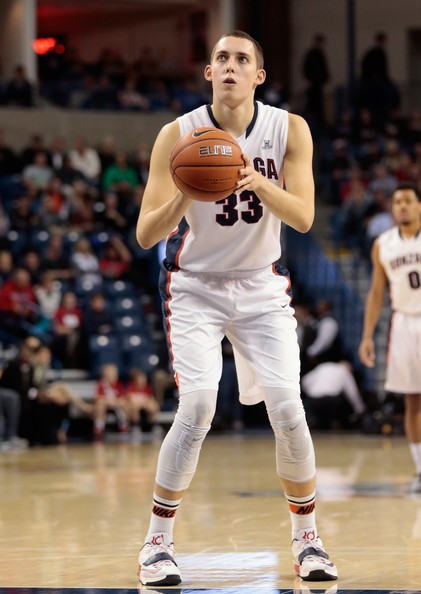
P.S.3: Olympiacos decided on Kyle Wiltjer (25-PF-2.08 m) to cover Kim Tillie’s absence, as they also have Agravanis in this position. The player is well known to anyone that studies the game and I believe that we will have the chance to say a few things after his debut. Wiltjer (that’s right, the son of Gregg…) was liked by Mike D’Antoni, who saw that he was able to develop him to a new Steve Novak (just remember how he shot in New York under D’Antoni), but it didn’t go through. When we were talking about Hogue last week, I said that I really don’t understand the existence of players with entirely different assets in the Reds list, given that they were looking at two Stretch-4s. Apart from Hogue (who plays at “5”) Olympiacos also considered Damjan Rudez and Dimitris Nichols, who plays at Cedevita, but none of them were chosen.
Translated by: George-Orestis Zoumpos




